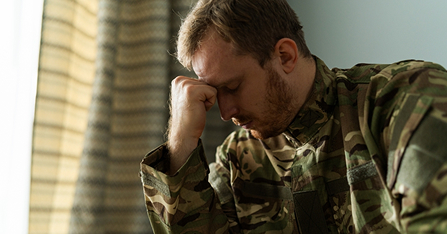As a veteran you are likely accustomed to putting others first, be it your family, friends, or country. Mental health struggles like social anxiety have become an all-too-common part of veterans’ post-service reality, but these issues often do not get the attention they deserve. At VetLaw, we are passionate about advocating for the rights of veterans. Whether you are fighting to increase your social anxiety disorder VA rating or you are struggling to secure the social anxiety VA disability benefits you deserve, our team of accredited VA disability attorneys can help. To speak with us about your case, consider scheduling your free case review today.

Contact Us Today
We Will Fight For Your Benefits
We guarantee 100% privacy. Your information will not be shared.
What Are the Signs and Symptoms of Social Anxiety?
Social anxiety, also known as social phobia, is a common type of anxiety disorder that causes feelings of fear in situations where a person may feel scrutinized or judged by other people, typically in social settings. Social anxiety can affect anyone and is highly prevalent across the United States, especially within the veteran population.
Activities such as public speaking, meeting new people, interacting with strangers, or being at a job interview may all trigger feelings of intense anxiety. Oftentimes, the feeling of anxiety in social situations that people with social anxiety experience feels beyond their control. For some, these feelings interfere with their ability to work and perform day-to-day tasks.
The signs and symptoms of social anxiety manifest differently in everyone, with some of the most common symptoms being:
- Constant worry that you will humiliate or embarrass yourself
- Avoidance of social situations, especially where you may be the center of attention
- Intense anxiety when interacting with strangers
- Reluctant to go places within your community
- Spending a great deal of time analyzing yourself after a social interaction
- Blushing, sweating, rapid heartbeat, and/or lightheadedness when speaking to people

Does the VA Consider Social Anxiety to Be a Disability?
Social anxiety can be a debilitating condition that makes it difficult to work, maintain relationships, and engage in daily routines. For this reason, the VA does consider social anxiety to be a disability. To secure social anxiety VA disability benefits, the following three criteria must be met:
- You have been diagnosed with social anxiety
- There was an in-service event, injury, or illness
- Your diagnosis can be directly connected to the in-service event, injury, or illness
An in-service event can include treatment for social anxiety during service or reporting symptoms of social anxiety during your discharge examination, for instance. You are not required to have been diagnosed with social anxiety during your military service. Even if your social anxiety was diagnosed after you were discharged from service, you may still be eligible for benefits as long as you can prove service connection.
How Does Military Experience Influence Symptoms of Social Anxiety?
Veterans face unique challenges and risks to their mental health as a result of their experience in the military. Exposure to stressful or traumatic situations, prolonged time away from home, and the difficulties of adjusting to civilian life can all impact a veteran’s mental health. After leaving the military, some veterans experience family or relationship issues, homelessness, and social exclusion, all of which can influence symptoms of social anxiety.
What Is the VA Rating for Social Anxiety?
Your social anxiety disorder VA rating is determined using the VA’s Schedule of Ratings for Mental Disorders (38 CFR § 4.130), Code 9403. When assigning a disability rating, the VA will consider your social and occupational impairment as well as the severity of specific symptoms. Disability ratings for social anxiety are granted in the following percentages: 0%, 10%, 30%, 50%, 70%, and 100%, with 0% being a prior diagnosis with minimal symptoms and 100% being total social and occupational impairment.
What If You Have PTSD and Social Anxiety?
For many veterans, PTSD and social anxiety go hand in hand. Research confirms this, indicating that 8% to 10% of combat veterans report symptoms of PTSD, of which 7-13% also reported symptoms of social anxiety. The same is true of non-combat veterans, who also experience a higher rate of PTSD and anxiety compared with civilians. Generally, if you have both PTSD and social anxiety, the VA will consider both disorders when assigning a disability rating.
Since social anxiety is commonly associated with PTSD, veterans may be eligible for a combined rating if their symptoms are severe and distinct. If you receive a PTSD diagnosis as well as a social anxiety diagnosis, the VA will provide a combined rating for the two service-connected conditions. If your PTSD is the cause of your social anxiety, on the other hand, you may benefit from pursuing a secondary service connection for your anxiety.
Can You Receive a Rating for Social Anxiety and Depression?
The VA recognizes that veterans are only required to speak to their own symptomology and how it impacts them on a daily basis. That being said, a service connection claim for one disorder – such as social anxiety – must be considered a claim for any applicable psychiatric disorder.
In other words, you do not need to file a separate claim for social anxiety and depression. If the VA determines that you struggle with distinct symptoms of anxiety and depression, you will be assigned a combined rating that reflects the totality of your symptoms. Indeed, many veterans receive a higher social anxiety disorder VA rating because they also suffer from symptoms of depression.

How Do You Prove Your Service Connection for Social Anxiety?
Service connection refers to the direct link between your disability and your military service. To prove direct service connection and be awarded social anxiety VA disability benefits, you must provide evidence that your condition was incurred during or aggravated by your time in the service. Typically, the most important evidence will be your medical records, which may include diagnostic tests, doctors’ notes, lab reports, and records of treatment. Additional evidence may be submitted to further support your claim, such as lay statements and vocational expert testimonies, for instance.
What If the VA Denies Your Claim for Social Anxiety?
If the VA denies your claim for social anxiety, it is important to move forward with an appeal. The VA provides three appeal options:
- Supplemental Claim to provide new evidence that will support your claim
- Higher-Level Review to request that a senior reviewer re-evaluates your claim
- Board Appeal to bring your claim to a Veterans Law Judge at the Board of Veterans’ Appeals
The option you utilize will depend on the unique circumstances of your case and the reason why your initial claim was denied. At VetLaw, our appeals team will review your situation and develop a legal strategy that maximizes your chances of success. We take the burden of navigating the VA process off your plate so you can focus on your health.
Hiring an Attorney Near You to Help with Your VA Disability Appeal for Social Anxiety
As a veteran-owned law firm, we have a firsthand understanding of the bureaucracy of the VA. At VetLaw, our team of experienced and accredited disability attorneys will advocate for you and guide you through every step of the process with compassion, professionalism, and zeal. We understand the complexities of the social anxiety disorder VA rating criteria and work diligently to assemble the strongest case possible for our clients. To learn how we can help, consider scheduling your no-risk, free case review today.

